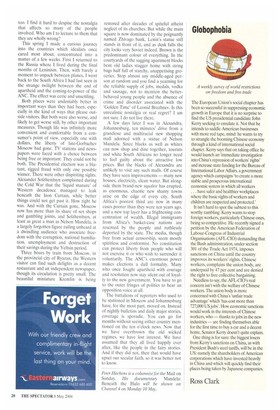Globophobia
A weekly survey of world restrictions on freedom and free trade The European Union's social chapter has been so successful in suppressing economic growth in Europe that it is no surprise to find the US presidential candidate John Kerry seeking to emulate it. Not that he intends to saddle American businesses with more red tape, mind: he wants to try to strangle the booming Chinese economy through a kind of international social chapter. Kerry says that on taking office he would launch an 'immediate investigation into China's repression of workers' rights' and increase state funding for the Bureau of International Labor Affairs, a government agency which campaigns 'to create a more stable and prosperous international economic system in which all workers ... have safer and healthier workplaces where the basic rights of workers and children are respected and protected.' It isn't hard to spot the subtext to this worthy rambling: Keny wants to stop foreign workers, particularly Chinese ones, being so competitive. He recently signed a petition by the American Federation of Labour-Congress of Industrial Organisations (AFL-CIO) demanding that the Bush administration, under section 301 of the Trade Act 1974, imposes sanctions on China until the country improves its workers' rights. Chinese workers, complains the union body, are underpaid by 47 per cent and are denied the right to free collective bargaining. Needless to say, the AFL-CIO's real concern isn't with the welfare of Chinese workers. The union body is more concerned with China's 'unfair trade advantage' which 'has cost more than 727,000 US jobs'. How economic sanctions would work in the interests of Chinese workers, who — thanks to jobs in the new industries — are finding themselves able for the first time to buy a car and a decent home, Senator Kerry doesn't quite explain. One thing is for sure: the biggest losers from Kerry's sanctions on China, as with President Bush's steel tariffs, will be in the US: namely the shareholders of American corporations which have invested heavily in China and which will quickly find their places being taken by Japanese companies.
Ross Clark












































































 Previous page
Previous page